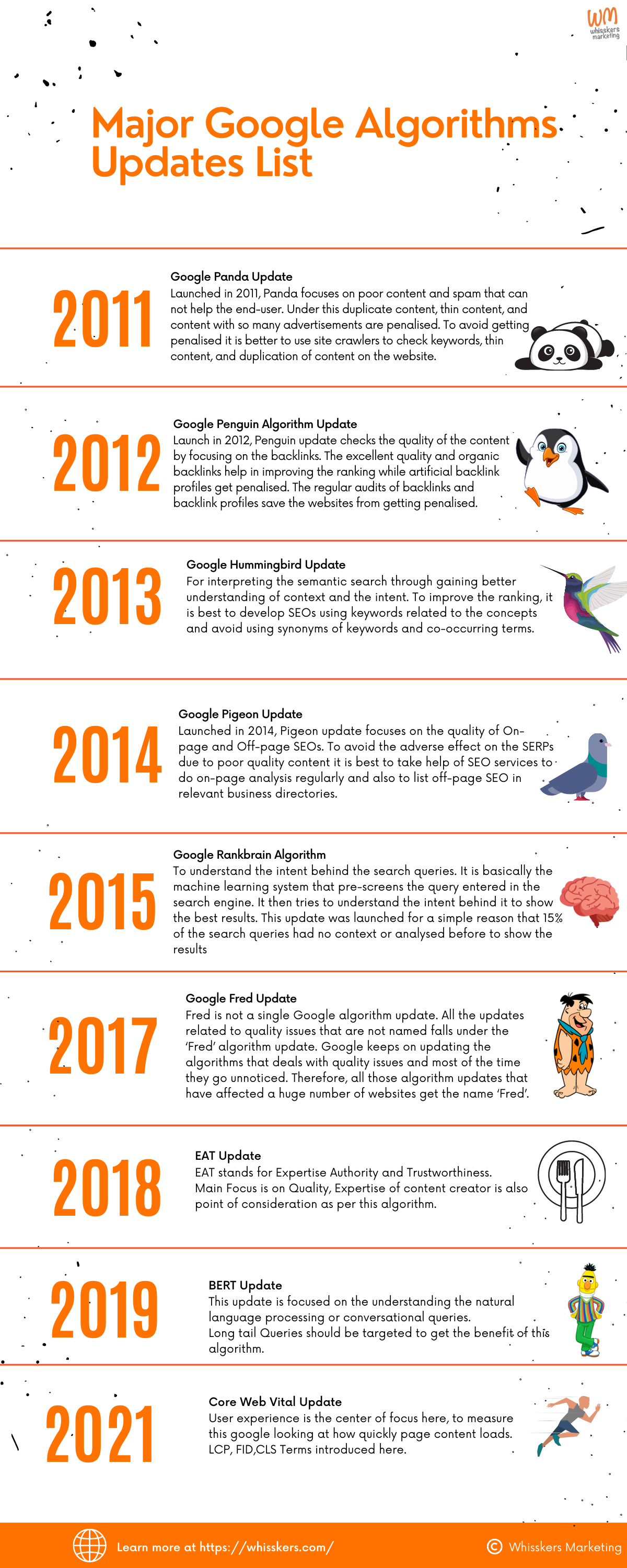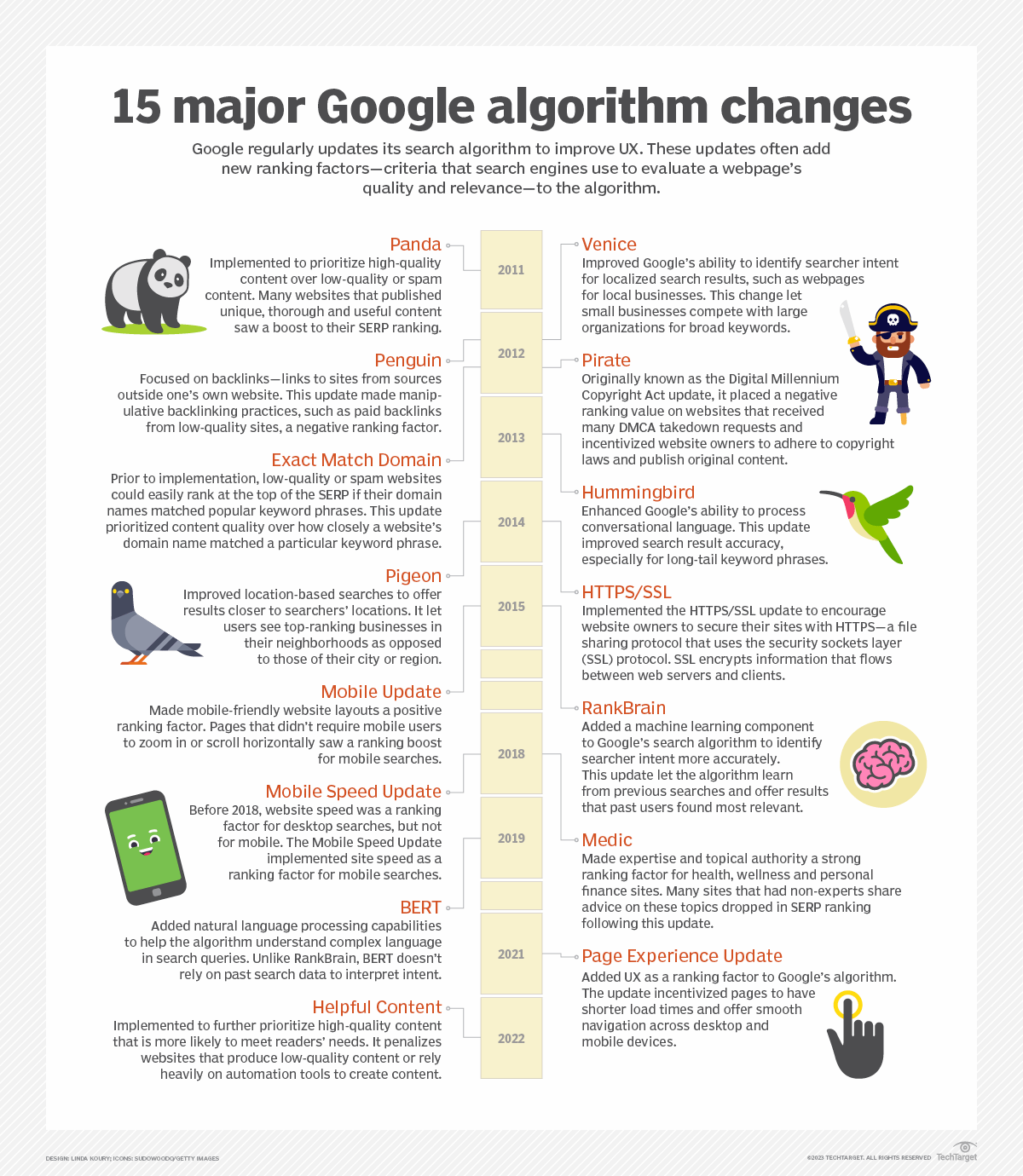Comprehending the Ramifications of Google's Algorithm Updates on SEO Techniques and Rankings
In the ever-evolving landscape of search engine optimization (SEARCH ENGINE OPTIMIZATION), the implications of Google's formula updates have actually come to be a prime focus for businesses and marketers intending to keep or boost their on-line exposure (Google’s Algorithm Updates). As Google continues to refine its algorithms to give customers with the most relevant and premium search results page, understanding just how these updates effect SEO rankings and approaches is extremely important. From the refined changes in keyword techniques to the more obvious emphasis on customer experience, the interaction between formula updates and SEO practices unveils an intricate web of factors to consider that demand constant caution and versatility
Advancement of Google's Algorithm
The Panda upgrade, launched in 2011, targeted low-grade web content and punished websites with replicate, thin, or irrelevant material. Penguin, released a year later, resolved link spam by cheapening manipulative web links. Hummingbird, introduced in 2013, noted a change towards semantic search, recognizing the context and intent behind user questions rather than just matching keywords.
These updates forced web site proprietors and SEO professionals to prioritize customer experience, top quality content, and natural link building techniques to boost their positions in Google's search results. The evolution of Google's algorithm highlights the internet search engine's dedication to delivering appropriate and useful content to individuals while punishing methods intended only at pc gaming the system.
Impact on Keyword Phrase Method
With the development of Google's formula towards prioritizing individual experience and content importance, the Influence on Keyword Technique has actually come to be significantly critical for internet site proprietors and search engine optimization specialists looking for to line up with these online search engine updates. Key phrases are no more nearly matching search terms but understanding customer intent and supplying useful material. Google's updates, such as BERT and RankBrain, concentrate on natural language processing and context, making keyword method a lot more sophisticated.

Moreover, with Google's emphasis on semantic search and user-focused material, key phrase padding is no much longer effective and can even harm rankings. Instead, incorporating keyword phrases normally right into high-grade, pertinent web content is key. By recognizing the impact of Google's algorithm updates on key words technique, site owners can improve their SEO efforts and improve their visibility in search results.
Adjustments in Web Content Optimization
As the landscape of search engine optimization continues to develop, web site owners and SEO professionals are seeing considerable shifts in content optimization techniques. In the wake of Google's formula updates, there has been an expanding focus on developing high-grade, pertinent, and authoritative material that provides worth to customers. This indicates that just stuffing keyword phrases into articles is no more efficient; instead, web content has to be well-written, appealing, and tailored to fulfill the demands of the target audience.
Moreover, there is a greater focus on customer experience and satisfaction, with search engines gratifying web sites that supply a seamless browsing experience and important info. As a result, material optimization currently entails not just including relevant keyword phrases normally however additionally structuring web content in a means that is easy to read and browse.
Importance of User Experience
Enhancing user experience on a site is critical in contemporary search engine optimization methods, acting as a critical consider identifying a site's presence and success in internet search engine positions. Customer experience incorporates numerous components such as website rate, mobile-friendliness, instinctive navigating, and appealing material (Google’s Algorithm Updates). Google's algorithms progressively prioritize web sites that provide a seamless and enjoyable customer experience, as it straight associates with customer satisfaction and retention
A positive customer experience not just improves a website's search engine optimization performance yet additionally adds to higher conversion prices and consumer loyalty. Sites that are easy to browse, visually appealing, and provide beneficial web content are most likely to bring in and keep visitors. In comparison, websites with inadequate individual experience metrics may our website experience high bounce rates and reduced dwell times, indicating to online search engine that the web content may not be appealing or pertinent for individuals.
For that reason, spending in enhancing user experience is crucial for preserving an one-upmanship in the ever-evolving digital landscape. By focusing on user-centric design and capability, sites can boost their online search engine positions and eventually drive even more organic website traffic and conversions.
Methods for Future Adjustment
Progressing in the rapidly progressing landscape of SEO, it is imperative for organizations to adopt ingenious approaches for future adjustment. One crucial approach is to concentrate on producing top quality, appropriate web content that offers worth to customers. This content ought to be maximized for key words that align with individual intent and need to be routinely updated to remain current and competitive.
In addition, companies ought to focus on mobile optimization to satisfy the increasing variety of users accessing the internet Full Article through mobile tools. Ensuring that websites tons swiftly, are simple to browse, and offer a seamless individual experience on mobile phones can aid boost search positions and user complete satisfaction.
Moreover, leveraging information analytics and customer actions insights can help businesses understand their target audience better and tailor their SEO strategies as necessary. By keeping track of essential performance indicators and readjusting approaches based on data-driven understandings, businesses can remain in advance of the contour and adjust to the ever-changing SEO landscape. Accepting emerging technologies, such as voice search optimization and artificial knowledge, can additionally be beneficial for future-proofing search engine optimization approaches.
Verdict

With the development of Google's algorithm towards prioritizing user experience and web content significance, the Effect check my site on Keyword phrase Technique has become increasingly crucial for internet site proprietors and SEO experts seeking to align with these search engine updates. Google’s Algorithm Updates. Key words are no much longer simply regarding matching search terms but understanding customer intent and supplying useful content. Google's formulas progressively prioritize websites that use a seamless and satisfying individual experience, as it directly associates with individual complete satisfaction and retention
In comparison, web sites with poor customer experience metrics may endure from high bounce rates and low dwell times, signifying to browse engines that the web content may not be relevant or interesting for individuals.
The evolution of the formula has actually moved emphasis towards customer experience and quality web content, impacting keyword method and content optimization.